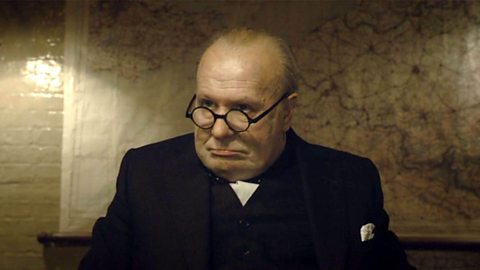Film review: Darkest Hour
 Alamy
AlamyGary Oldman’s portrayal of Winston Churchill in Darkest Hour could put him in contention for an Oscar, writes critic Nicholas Barber.
Spoiler alert! In June 1940, a flotilla of civilian boats rescued thousands of British troops from a beach in northern , and Winston Churchill, one of the men responsible for the rescue, went on to lead Britain to victory against . Actually, maybe it’s not much of a spoiler. However many school history lessons you may have skipped, you probably know that, on balance, Churchill did better than Hitler in World War Two. But Joe Wright’s Darkest Hour is so breathlessly tense that at times you may forget how well the Dunkirk evacuation went. You may even forget the rest of Churchill’s triumphs. In parts of this propulsive, well-appointed and wonderfully acted period drama, his situation is so precarious it doesn’t look as if he’ll last the year, let alone the war. Never mind his battles with Hitler and Mussolini, his battles with politicians in his own party are testing enough.
As the massive on-screen captions tell us, the story begins in May 1940, when three million German troops reach the Belgian border. Over in Britain, parliament has lost faith in the terminally ill Conservative prime minister, Neville Chamberlain (Ronald Pickup). Conservative grandees hand the top job to Churchill (Gary Oldman), because he is the only candidate the opposition party will accept. But they have their doubts about following a fat old eccentric whose decisions led to catastrophic losses in the Gallipoli campaign in World War One, and whose blood is now equal parts champagne, whisky and bacon fat. Churchill has barely unpacked his suitcases in 10 Downing Street before Chamberlain and the Earl of Halifax (Stephen Dillane) start plotting to turf him out again. And the more pugnacious his anti-Hitler rhetoric gets, the more certain they are that negotiating with Hitler might not be such a bad idea.
Luckily for Churchill, he has the of his wide-eyed secretary (Lily James), a working-class angel who informs him that when he does his ‘V for Victory’ hand gesture the wrong way round, it translates as: “Up your bum.” He also has the indefatigable loyalty of his no-nonsense wife Clementine (Kristin Scott Thomas), who – like so many big-screen heroines – is there to give the hero pep talks while tying his bow tie. But Churchill’s idiosyncrasies and stubbornness worry everyone else, up to and including King George VI (an amusingly exasperated Ben Mendelson). When the King proposes that they should schedule their weekly meetings for 4:00 pm, Churchill retorts that that’s impossible: four o’clock is when he takes his nap.
While Christopher Nolan’s prodigious Dunkirk dramatised the retreat from , and ignored all of the planning that preceded it, Darkest Hour does the opposite. Having staged a breathtaking five-minute tracking shot along Dunkirk’s beach in Atonement, Wright may well have felt that he couldn’t possibly top it. And so, there is one brief shot of the legendary ‘little ships’ setting sail from England, and a few glimpses of hellish French battlefields, but the film concentrates on middle-aged men arguing with each other in rooms filled with cigar smoke. Nonetheless, Wright treats his talky political drama as if it were a pulse-pounding action movie. Thanks to Bruno Delbonnel’s flashy camerawork, Valerio Bonelli’s snappy editing and Anthony McCarten’s punchy, funny dialogue, the debates have the impact of explosions, and Churchill’s strolls through his headquarters have the hurtling momentum of a car chase.
Unsurprisingly, much of the film’s boisterous energy is generated by its tremendous central performance - as dampened as it is by the leading man’s prosthetic jowls. The result of all that cutting-edge make-up is that Oldman doesn’t look much like himself, but he doesn’t look much like Churchill, either. And yet the actor’s twinkle-eyed gusto brings the prime minister to vigorous life. He is a force of nature who can overflow with anger and guffawing jollity, sometimes within the same sentence, but who can also be paralysed by depression.
It’s not a wholly flattering portrayal. What is so clever about the film is that, while we tend to assume that Churchill’s hawkish policies were the right ones, and that his opponents were deluded cowards, Darkest Hour isn’t quite so sure. The hero’s rants about fighting to the last man can seem dangerously fanatical, and Halifax’s measured pleas on behalf of peace talks can seem persuasively sensible. It’s not that you’re ever on Halifax’s side, exactly – Dillane is too smooth and lizardy for that – but you can see why people might not have been on Churchill’s side, either.
Towards the end, though, the script’s balance is upset by two clunking scenes. First, there is a late-night bonding session with King George, a cosy tête-à-tête that suggests the royal family saved Britain from the Nazis. Then comes an all-too-convenient meeting with a focus group of cheery cockneys, who assure Churchill that they’re behind him all the way. These hokey sequences, along with a few other clichéd ones, drag Darkest Hour down from a great film to a good one. But there is definitely greatness in the way Oldman takes a role that has already been played by so many actors, and makes it utterly his own. Don’t bet against him flashing that ‘V For Victory’ sign on Oscar night.
★★★★☆
If you would like to comment on this story or anything else you have seen on BBC Culture, head over to our Facebook page or message us on Twitter.
And if you liked this story, sign up for the weekly bbc.com features newsletter, called “If You Only Read 6 Things This Week”. A handpicked selection of stories from BBC Future, Earth, Culture, Capital and Travel, delivered to your inbox every Friday.
